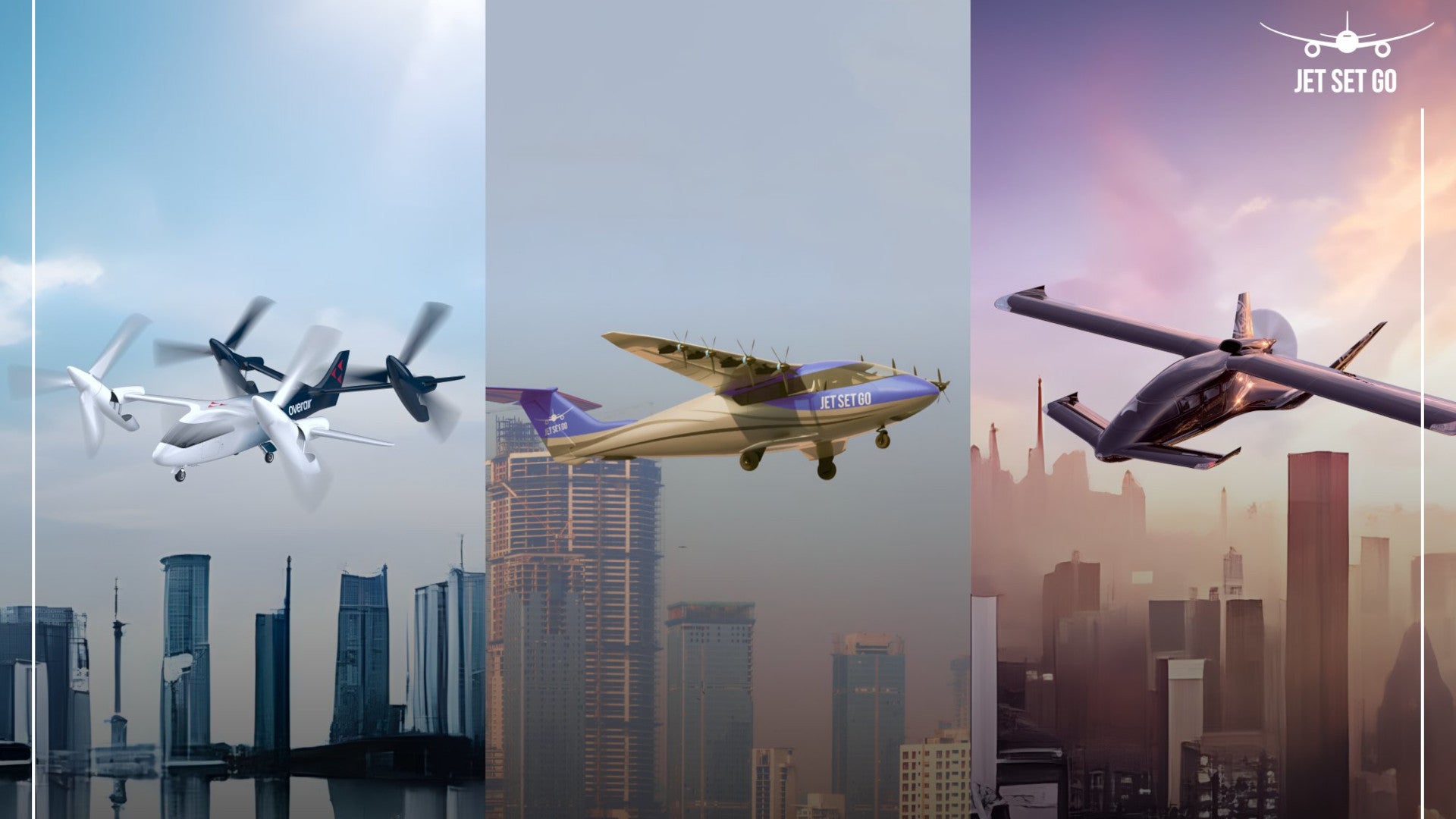Three North American manufacturers will deliver electric air taxis to India to help jump-start the country’s advanced air mobility (AAM) industry.
JetSetGo, an Indian marketplace for private jet and helicopter charters that also operates its own fleet, on Friday announced strategic partnerships with Horizon Aircraft, Overair, and Electra.aero to order as many as 280 aircraft, which would value the deal at a whopping $1.3 billion.
Each of the electric or hybrid-electric aircraft will bring unique capabilities to JetSetGo’s fleet, which comprises five midsize Hawkers and six other aircraft, ranging from large cabin jets to helicopters.
Horizon’s vertical takeoff and landing (VTOL) Cavorite X7 and Electra’s ultra-short takeoff and landing (STOL) nine-seater—both hybrid-electric designs—will be the first to fly JetSetGo routes since they can utilize existing infrastructure, the company said. Overair’s Butterfly electric VTOL (eVTOL) air taxi will follow as Indian cities add the necessary infrastructure, such as charging stations.
The three designs will offer an “optimal mix” for five use cases identified by JetSetGo: airport transfers, regional connectivity, intercity commute, intracity shuttles, and urban air taxis. The company says India—which is plagued by road congestion issues, infrastructure challenges, and aviation emissions—will make an “ideal testbed” for AAM services.
“Our partnership with these three leading innovators will introduce unique technologies like ‘blown lift’ and ‘fan-in-wing’ lift systems, hybrid and electric propulsion, and super-quiet optimal speed tilt rotors to India,” said Kanika Tekriwal, co-founder and CEO of JetSetGo. “We want to lead the transformation of urban and regional connectivity and believe we have the right partners and technologies to make this vision a reality.”
The agreements lock JetSetGo into 150 firm orders—50 from each manufacturer—for a combined $780 million. But all three contracts include the option for it to acquire more aircraft.
Horizon, which announced its agreement earlier this week, will ship an initial batch of 50 Cavorite X7s to JetSetGo for $250 million. The firm has the option to acquire 50 more, which would double that deal’s value. Overair and Electra did not specify the initial order value or number of options JetSetGo could acquire.
Horizon founder and CEO Brandon Robinson characterizes the company’s X7 as a “normal” aircraft with eVTOL capabilities, rather than an eVTOL with features of a traditional airplane. It uses a patented “fan-in-wing” configuration, similar to the Lilium Jet: 14 electric ducted fans are embedded in the wing to provide lift. During cruise, movable surfaces cover the fans.
The X7’s mix of features from traditional and electric aircraft make it something of an amalgamation. It can take off vertically or conventionally from the runway, for example, and a gas-powered range extender can charge its batteries during cruise. The air taxi won’t reduce emissions as much as all-electric designs, but Horizon says it will offer greater range, speed, and payload.
“This evolution will serve as a catalyst to accelerate our growth by providing the resources to continue the development and testing of our practical, real-world-use hybrid eVTOL, the Cavorite X7,” said Robinson.
Like the X7, Overair’s Butterfly offers some unique capabilities. The eVTOL deploys two technologies the firm says have never been integrated on an eVTOL design: optimum speed tilt rotor (OSTR) and individual blade control (IBC).
OSTR, which varies propeller revolutions per minute during vertical, forward, and transition flight, acts as a power saver, reducing energy demand in hover by as much as 60 percent. IBC, which is being researched by the U.S. Navy, limits the vibration of each blade to reduce propeller load and enable safer, smoother flights.
The combination of OSTR and IBC produces efficient, quiet propulsion through nearly any weather, temperature, or altitude, Overair says. Butterfly also features four oversized rotors, large cabin, and payload of about 1,100 pounds—enough for five passengers and their luggage. The company says it is ideal for passenger, medical, cargo, and military applications.
“Butterfly will provide a safe, quiet, and efficient mobility solution for urban and regional transport across the broadest range of weather conditions and geographic environments,” said Valerie Manning, chief commercial officer at Overair. “In addition, the associated advanced air mobility ecosystem will create a multitude of jobs and fuel economic growth.”
As the lone all-electric VTOL manufacturer included in JetSetGo’s agreements, Overair will also support its new customer with infrastructure advisement, pilot training, infrastructure and software integration, operational guidance, and vertiport software integration.
Electra’s nine-seat design is also all-electric, but it won’t require VTOL infrastructure to get flying. The eSTOL design needs just 150 feet of runway for takeoff—that’s enabled through a unique technology called blown-lift, which allows the aircraft to take off at speeds as slow as a car driving through a residential neighborhood.
The eSTOL has a range of 500 nm and can carry up to 2,500 pounds of cargo. Compared to vertical takeoff alternatives, Electra claims the model offers more than twice the payload, 10 times the range, and 70 percent lower operating costs.
“Our aircraft’s unique ability to operate from soccer field-sized spaces, with the capacity to transport nine passengers up to 500 miles enables JetSetGo to identify new routes using eSTOL capability and deliver sustainable, affordable air connections to India’s communities previously underserved by flight,” said Marc Ausman, chief product officer of Electra.
Electra’s design was part of another massive hybrid-electric aircraft order from Dallas-based regional air carrier JSX. In December, the semiprivate operator signed letters of intent to acquire as many as 332 aircraft, including 32 firm orders and 50 options from Electra. JSX will also purchase Aura Aero’s Era and Heart Aerospace’s ES-30.
Several other American operators, including Surf Air Mobility and Bristow Group, have agreed to order or retrofit hybrid-electric designs as they seek to introduce new, sustainable, and potentially more cost-effective aircraft to their routes. In India, meanwhile, travel conglomerate InterGlobe in November agreed to purchase as many as 200 Midnight air taxis from Archer Aviation.
Like this story? We think you’ll also like the Future of FLYING newsletter sent every Thursday afternoon. Sign up now.
